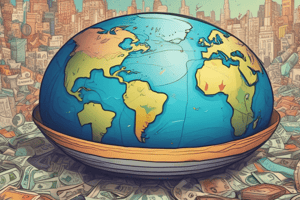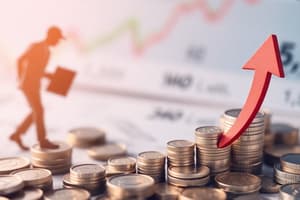Podcast
Questions and Answers
Kinh tế học Vĩ mô tập trung nghiên cứu những vấn đề nào?
Kinh tế học Vĩ mô tập trung nghiên cứu những vấn đề nào?
- Các vấn đề kinh tế cá nhân và gia đình
- Các vấn đề tài chính của doanh nghiệp
- Các vấn đề kinh tế cơ bản trên phạm vi tổng thể nền kinh tế (correct)
- Các vấn đề kinh tế trên quy mô toàn cầu
Chuyên ngành nào dưới đây không phải là một phần của Kinh tế học Vĩ mô?
Chuyên ngành nào dưới đây không phải là một phần của Kinh tế học Vĩ mô?
- Quản lý doanh nghiệp (correct)
- Lạm phát
- Tăng trưởng kinh tế
- Thất nghiệp
Mục tiêu chính của Kinh tế học Vĩ mô là gì?
Mục tiêu chính của Kinh tế học Vĩ mô là gì?
- Nghiên cứu các vấn đề kinh tế cơ bản và tổng thể (correct)
- Nghiên cứu giao dịch hàng hóa
- Phân tích các quyết định tiêu dùng của hộ gia đình
- Đánh giá hiệu quả của các doanh nghiệp
Trong Kinh tế học Vĩ mô, lạm phát được xem là một trong những vấn đề gì?
Trong Kinh tế học Vĩ mô, lạm phát được xem là một trong những vấn đề gì?
Kinh tế học Vĩ mô không nghiên cứu về lĩnh vực nào dưới đây?
Kinh tế học Vĩ mô không nghiên cứu về lĩnh vực nào dưới đây?
Giá dầu lửa những năm 2000 so với những năm 90 đã thay đổi như thế nào?
Giá dầu lửa những năm 2000 so với những năm 90 đã thay đổi như thế nào?
Lý do nào dưới đây không phải là nguyên nhân của tỷ lệ thất nghiệp tăng đột biến vào đầu những năm 90?
Lý do nào dưới đây không phải là nguyên nhân của tỷ lệ thất nghiệp tăng đột biến vào đầu những năm 90?
Nhận định nào sau đây đúng về việc hút thuốc lá?
Nhận định nào sau đây đúng về việc hút thuốc lá?
Để cải thiện mức sống của người nghèo, chính phủ nên làm gì?
Để cải thiện mức sống của người nghèo, chính phủ nên làm gì?
Nhận định nào sau đây thể hiện quan điểm chuẩn tắc?
Nhận định nào sau đây thể hiện quan điểm chuẩn tắc?
Flashcards
Kinh tế học vĩ mô là gì?
Kinh tế học vĩ mô là gì?
Kinh tế học vĩ mô nghiên cứu các vấn đề kinh tế của toàn bộ nền kinh tế.
Kinh tế học vĩ mô nghiên cứu những gì?
Kinh tế học vĩ mô nghiên cứu những gì?
Kinh tế học vĩ mô tập trung vào việc phân tích các yếu tố như tăng trưởng kinh tế, lạm phát, thất nghiệp, và chính sách kinh tế.
Phương pháp nghiên cứu trong Kinh tế học vĩ mô?
Phương pháp nghiên cứu trong Kinh tế học vĩ mô?
Kinh tế học vĩ mô sử dụng các mô hình và phân tích thống kê để nghiên cứu các vấn đề kinh tế.
Lợi ích của việc học Kinh tế học vĩ mô?
Lợi ích của việc học Kinh tế học vĩ mô?
Signup and view all the flashcards
Vai trò của Kinh tế học vĩ mô?
Vai trò của Kinh tế học vĩ mô?
Signup and view all the flashcards
Giá dầu lửa những năm 2000 đã tăng gấp đôi so với những năm 90. Nhận định này mang tính thực chứng hay chuẩn tắc?
Giá dầu lửa những năm 2000 đã tăng gấp đôi so với những năm 90. Nhận định này mang tính thực chứng hay chuẩn tắc?
Signup and view all the flashcards
Vào đầu những năm 90, tỷ lệ thất nghiệp ở nước ta tăng đột biến. Nhận định này mang tính thực chứng hay chuẩn tắc?
Vào đầu những năm 90, tỷ lệ thất nghiệp ở nước ta tăng đột biến. Nhận định này mang tính thực chứng hay chuẩn tắc?
Signup and view all the flashcards
Hút thuốc không có ích đối với xã hội và không nên khuyến khích. Nhận định này mang tính thực chứng hay chuẩn tắc?
Hút thuốc không có ích đối với xã hội và không nên khuyến khích. Nhận định này mang tính thực chứng hay chuẩn tắc?
Signup and view all the flashcards
Để cải thiện mức sống của người nghèo, chính phủ cần tăng trợ cấp đối với họ. Nhận định này mang tính thực chứng hay chuẩn tắc?
Để cải thiện mức sống của người nghèo, chính phủ cần tăng trợ cấp đối với họ. Nhận định này mang tính thực chứng hay chuẩn tắc?
Signup and view all the flashcards
Nhận định mang tính chuẩn tắc là gì?
Nhận định mang tính chuẩn tắc là gì?
Signup and view all the flashcards
Study Notes
Macroeconomics Study Notes
- Macroeconomics is a branch of economics that studies fundamental economic issues at the aggregate level of the entire economy.
- It focuses on large-scale economic phenomena, rather than individual markets or the behavior of specific firms or consumers.
- Key topics in macroeconomics include national income, unemployment, inflation, economic growth, and the role of government in managing the economy.
- Macroeconomics examines relationships between various aggregate economic variables, such as the relationship between inflation and unemployment (Phillips Curve).
- It analyzes the performance of the economy as a whole, including the overall level of output, the rate of employment, and the price level.
- Macroeconomic analysis considers factors influencing overall economic performance, such as aggregate demand and aggregate supply.
- Macroeconomics models are built to understand how different policies and events can affect the economy as a whole.
- These models often use simplified representations of the economy to isolate the effects of specific variables or events.
- Macroeconomics plays a vital role in shaping government economic policies, helping to understand and manage the economy.
- It considers various aspects of economic activity, such as consumption, investment, government spending, and net exports.
- The study examines how these components interact to determine the overall level of economic activity.
- Macroeconomics helps us to understand the reasons behind booms and recessions in the economy, the causes of inflation and unemployment, and how economic fluctuations can be mitigated.
- It provides tools for analyzing the impact of government policies, such as fiscal and monetary policy, on the overall economy.
- Macroeconomics explores the complex interactions between different economic agents, like consumers, firms, and the government, and how these interactions influence aggregate outcomes.
- One crucial area in macroeconomics is the study of economic growth, which focuses on the factors that contribute to increases in the standard of living and production over time.
- Issues like productivity growth, technological advancements, and capital accumulation are central to understanding economic growth patterns.
- Macroeconomic models are crucial for forecasting future economic conditions and making informed policy decisions.
- Macroeconomic analysis helps policymakers design and implement policies aimed at achieving desirable economic outcomes, such as full employment, stable prices, and sustainable economic growth.
Key Concepts in Macroeconomics
- Gross Domestic Product (GDP): A measure of the total value of goods and services produced within a country's borders in a specific period.
- Inflation: A general increase in the prices of goods and services in an economy over a period.
- Unemployment: The state of being without a job when actively seeking one.
- Economic Growth: A sustained increase in the real GDP of an economy over a period.
- Aggregate Demand (AD): The total demand for goods and services in an economy at a given price level and period.
- Aggregate Supply (AS): The total supply of goods and services produced in an economy at a given price level and period.
- Fiscal Policy: Government policies related to taxation and government spending.
- Monetary Policy: Government policies related to the money supply and interest rates.
- Business Cycles: Periodic fluctuations in economic activity, including periods of expansion and contraction.
Additional Information from the provided text
- Oil prices doubled in the 2000s compared to the 1990s.
- Unemployment rates increased significantly in the early 1990s.
- Smoking is detrimental to society and should not be encouraged.
- To improve the living standards of the poor, the government needs to increase their subsidies.
Importance of Macroeconomics
- Understanding macroeconomic trends helps businesses make informed decisions about production and investment.
- It aids governments in formulating policies to stabilize the economy and promote growth.
- It helps individuals understand how the overall economy affects their personal finances
Studying That Suits You
Use AI to generate personalized quizzes and flashcards to suit your learning preferences.




